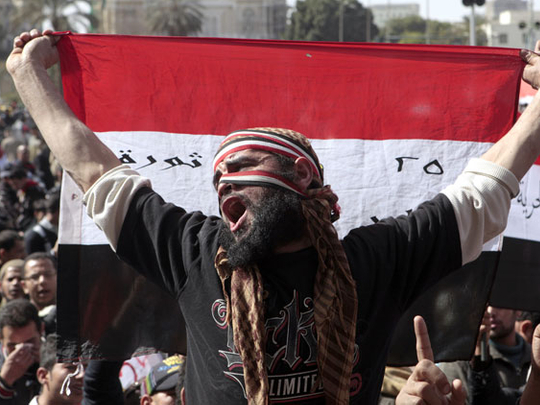
Extraordinary as it is to recall, when I returned to Egypt two years ago former president Hosni Mubarak's plan to hand power to his son Jamal was deemed a fait accompli. I began calling for a new Egypt based on basic freedoms, democracy and social justice. In return I was branded as anti-Islam, an American, Israeli and even as an Iranian agent. My daughter's Facebook account was hacked, and her private pictures posted on the web.
So February 11,2011 was among the more memorable days of my life: on a warm evening in Tahrir Square, all eyes were glued to vast screens as the hastily appointed vice-president announced that Mubarak was leaving office. Never had I believed I would see this day. Yet one year on, Egypt is again in turmoil. A revolution built on hope has marked its anniversary with millions again on the streets, criticising the military for fumbling the transition to democracy. Many onlookers point to an erratic transitional plan and an economy in shambles. The state security apparatus is dysfunctional, as illustrated appallingly in the February1 football slaughterhouse; its personnel and culture remain the same as under Mubarak. Should we be lowering our expectations for Egypt's democracy? Absolutely not.
Of course, it has been a disappointing and often troubling year. When the army took over, their tanks were met with jubilation and flowers: they were the protectors of the revolution. But they had no experience in running the country — nor were they expected to do so. At first they said the transition would take six months. That was naive; I said it would take two years to build a democratic framework, advocating a transitional council of civilians and military, and an assembly to write a constitution.
Transitional government
It was not to be. By the time I was invited to my first meeting with them, the military had charted a course in reverse. Constitutional amendments were put to a referendum, only for the constitution to be abolished a few days later and replaced with an interim version penned by the military. When I went to vote on the referendum, I was attacked and my car smashed by thugs who appeared to be working for state security.
The election for the lower house of parliament took three months. It is taking another two to elect the second, powerless chamber. For new voters, it has been bewildering. Free and fair elections? Yes, but not representative: the youth who triggered the revolution ended up with a handful of seats; women less than 2 per cent; Coptic Christians, about 10 per cent of the population, less than 2 per cent; Islamists, a skewed representation, about 70 per cent, because Egyptians were looking for a strong alternative to the Mubarak crowd. So while we are, theoretically, on schedule to complete the transition to civilian rule by the end of June, the real challenges begin in July, with the new leadership in place.
Clearly the performance of the transitional government has been below expectations. Egyptians have seen little positive change. The government-controlled media is no longer a mouthpiece for Mubarak; it is now a mouthpiece for the military. Egyptians are furious that almost 12,000 activists from early 2011 face military trial and that the much despised emergency law has not been rescinded.
The lack of security and of a clear political plan has taken its economic toll. Our foreign reserves of $36 billion (Dh132 billion) have dwindled by almost two-thirds; economists say they will last only through March. About 1,000 factories have closed. Tourism has shrivelled. Foreign direct investment has halted. Unemployment is 15 per cent. Much of this is symptomatic of a nascent revolution. But how can we ensure these are teething problems and do not portend greater turmoil?
Much depends on the constitution due for adoption in six weeks. Will it guarantee human rights and freedoms? Can the new parliament and government deliver on those guarantees in law and practice? Can they lift so many Egyptians from poverty?
Some are sceptical about the influence of the Islamists. After decades of banishment from the political scene, they have no experience in governing. Before the revolution, we fought together; in the new Egypt, we have differing perspectives. On the eve of January 28 last year, two of their leaders were arrested leaving my home. One is now the speaker of the parliament. I called him to wish him success. I predict the Islamists will embrace other political factions, support free markets and be pragmatic.
It is time to set aside our differences. We need the strength of a unified Egypt: ensuring judicial independence, protecting media freedom and civil society, and tapping Egypt's potential as an emerging market. With the lack of a democratic framework, I recently bowed out of the presidential race. I believe I can contribute more if I am not wading through the political muck and hope to help groom the youth that triggered the revolution so they can take over the leadership of the country in the next election. I also want to focus on bolstering our eroding social cohesion. I have no illusions: the road ahead is long and difficult. Yet we have one undeniable achievement to bolster our confidence: the culture of fear has gone forever. Despite the ups and downs of the past year I believe with all my heart that our revolution will succeed.
— Financial Times
Mohamed ElBaradei is the 2005 Nobel Peace Prize winner and director-general emeritus of the IAEA.










